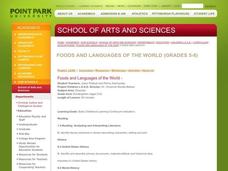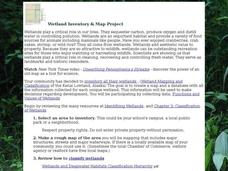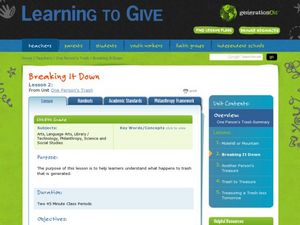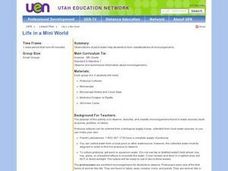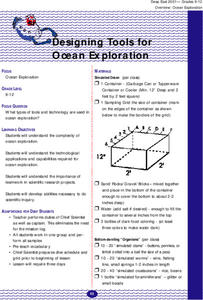ARKive
Biodiversity and Evolution – Darwin’s Finches
Teens experience natural selection firsthand (or first beak) in an activity that has them act as finches foraging for food. Using different household items to act as different beak styles, your little finches will collect as much...
Curated OER
Food Pyramid Abacus
Students investigate the Food Pyramid by constructing a creative project known as a Food Pyramid Abacus. They correlate the color beads withe each food group and the number of recommended servings from each. The abacus is a learning tool...
Curated OER
Foods and Languages of the World
Students study world cultures with an emphasis on languages and cultures. In this world cultures lesson, students study the countries of Spain, China, Italy, and the United States. Students read the story Everybody Cooks Rice and move...
Curated OER
What Happens to Rice at the Mill
First graders investigate rice farming by creating an art project. In this agriculture activity, 1st graders read about the path rice takes from a mill to your plate. Students utilize a piece of paper to create a...
Curated OER
The Fastest Pig in the West in the Classroom: Rice in China
Students explore agriculture by reading a children's book in class. In this Chinese culture activity, students read a chapter from the book The Fastest Pig in the West and identify the importance of rice in China's economy and culture....
Curated OER
Rice
Third graders develop a creative art project. In this rice lesson, 3rd graders learn about rice, when and how it is harvested, and how it is stored. Students make rainbow rice and use it to create other art projects.
Curated OER
Wetland Inventory and Map Project
In this wetlands inventory and map project worksheet, learners do research on the wetlands and complete a map project about it. Students follow 6 sets of directions with Internet links.
Curated OER
Fill The Bill
Students identify and describe five different types of beaks. Using that information, they explain how each of them is adapted to feed on different foods. In groups, they travel around the room to various stations in order to practice...
Curated OER
Importance of the Rain Forest
Students use the Internet to conduct a research project. In this rain forest instructional activity, students work in groups to research different parts of the rain forest. Students research climate, foods, house products and...
TerraCycle
What Can Nature Teach Us about Sustainable Design?
Talk about Velcro®, Gecko Tape, WhalePower turbine blades, and other innovations that mimic nature to inspire your STEM or engineering class. This set of worksheets gets them thinking about imitating nature in terms of sustainable...
Curated OER
Bean and Ozone Project
Students performed an experiment in which they grew beans in an ozone chamber and some in regular air in order to see if the ozone causes damage to the plants.
Curated OER
Wetland Metaphors
Students describe the characteristics of wetlands and identify their ecological functions. They inspect items and use them to create metaphors about wetlands.
Curated OER
Toting the Log and Lifting the Babe
Students use simple machines that demonstrate force, friction, work and power. They investigate and explain simple machines.
Curated OER
Quick Breads, Pancake/Waffle Lab
Students explore the bread, cereal, grain food group on the Food Guide Pyramid. They test recipes for quick breads which are high in carbohydrates and determine the purpose of each of the ingredients in pancakes or waffles.
Curated OER
One Person's Trash: Breaking it down
Students research how trash is disposed of and make an edible landfill. In this trash lesson plan, students research proper trash disposal, and discuss how trash affects the community. Then they make an edible landfill.
Curated OER
Amylase
Students examine what amylase is and its history. In this digestive lesson students study the effect amylase has on starch and how temperature affects the rate of activity.
Curated OER
Life in a Mini World
Sixth graders observe, describe, and classify microorganisms found in water sources. In small groups, they make their own slide, observe the Protozoa under a microscope, and record and classify the microorganisms.
Curated OER
Slurrp
In this agriculture worksheet, pupils find the facts needed to construct a website focused around giving information about products that are made from corn.
Curated OER
Designing Tools for Ocean Exploration
Learners research the methods and tools used in ocean exploration. They, in groups, simulate an ocean exploration and consider what tools facilitate the exploration's objectives.
Curated OER
Diet: Cereal Grains and Nutrition
Students identify the nutritional value of various cereal grains. Without adding sugar, they cook with grains and compare the taste to cereal containing sugar. In addition, students complete worksheets about the different grains,...




